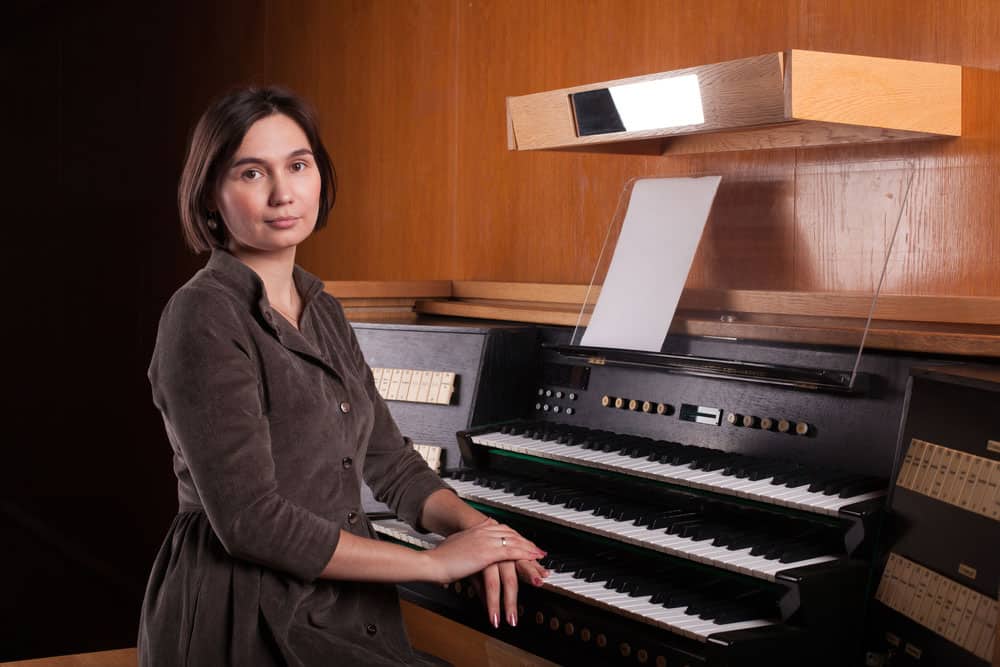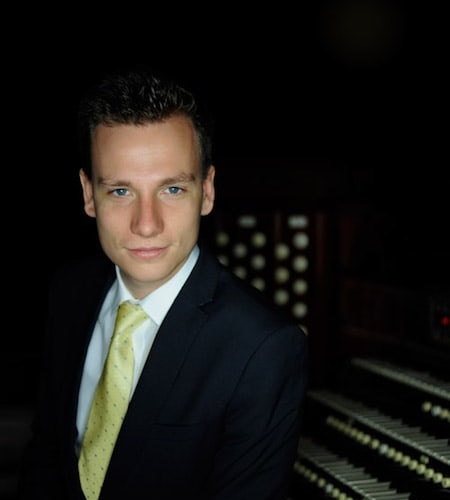Music Career Finder
Survey Start
Church Organist

How To Become a Church Organist
- Career Description
- Salary
- Career Outlook
- Career Path
- Experience & Skills
- Education & Training
- Additional Resources
- Sources
- References
Career Description
Benjamin Sheen is the Assistant Organist at St. Thomas Church, 5th Avenue, in New York City. Like many Organists, his work consists of more than simply performing music.
He explains, “My work here at the Saint Thomas Church and Choir School in New York is primarily focused on playing all of the music for the church services and accompanying the choir. I also focus a lot of my time on assisting the Director of Music in teaching the choir boys, who range between the ages of 3rd and 8th Grade and are residential in the school.
“The choir school at St. Thomas is an entirely unique establishment in North America, providing education solely to the choir boys who sing in church. Their days begin with a choir rehearsal with me before they head off to a full day of lessons and then walking to the church to sing evensong on Tuesday, Wednesday and Thursday evenings.
“They also have a full day of singing on a Sunday, singing both in the morning and afternoon at church. On top of working with the choir, my day includes practice, office work and touring frequently around the USA and further afield – so, all in all, a very busy schedule!”
While not all Organists have schools attached to the churches where they serve, most work frequently with church choirs, both for regularly scheduled services, and for life events such as weddings or funerals. Organists also work alongside Choir Directors, Cantors, clergy, parishioners, and other musicians.
Salary
On average, Church Organists earn approximately $29,200 per year. The general salary range for Organists is $17,000 to $41,000.
“Many Organist jobs across the United States are salaried and often some sort of accommodation is provided as part of the package,” Sheen explains. “For example, my church job is salaried but my external performances are paid per performance. Many Organists also conduct, teach, and coach other musicians as additional income.”
Hey, what do you think about trying our new Music Career HelperMusic Career Helper really quick? It’s totally free and could help get your career moving fast! Give it a try. It’s totally free and you have nothing to lose.
Career Outlook
Like most musicians, Organists spend a good deal of time working behind-the-scenes in addition to their performance and concert appearances. Clearly, Organists perform at rehearsals and regular holiday or weekend services, but that’s not all there is to the work.
Jones says his “time on the job is spent teaching other people and off the job is picking music. So you need to study your scores and learn the music. You need to learn the recordings so you get ideas. Go to concerts. There’s a lot of administration.
“I’ll give you an example; right now we’re doing the standing and seating orders and putting together fourteen pieces of music. We have to hire professionals. Like anything worth doing, it takes work to put it together. [It’s about] developing yourself, reading.”
Career Path
The idea of advancement is difficult to quantify when speaking about a career as an Organist. Some Organists hold part-time positions; in this situation, gaining a full-fledged Organist position with a church that has a well-regarded, established organ music program would represent a significant step forward.
Of course, recording an album of music and touring to perform concerts at prestigious venues also means an increase in acclaim, renown, and perhaps income.
“For an Organist, the starting point is, of course, the church,” Sheen says. “Most Organists will have started at their school, which would have had an organ or Organ Teacher available to them, and perhaps had a local church job in their teenage years (speaking from experience here).
“As I mentioned earlier, there are many wonderful opportunities for organ scholarships across this country, which is where you would learn the important skills of choir training, performing and also teaching.
“My time at Oxford University provided me with the skills to then move to the United States to pursue my master’s degree at the Juilliard School and obtain a job at one of the top churches for choral and organ music in the USA today.”
- “Seek advice from your Teacher and research the jobs out there that may become available.
- Take every opportunity to increase the range of your skill set. In other words, try to get experience or lessons in choral directing, teaching singing, accompanying, as well as just playing repertoire.
- Pursue degrees or diplomas that will make you shine out among other Organists.
- Always push yourself that one step further; there is an awful lot of music out there to learn and also people to learn from. Dedication and perseverance are extremely valuable attributes to any potential employer.”
Experience & Skills
Obviously, performance experience and musical study are integral experiences for the aspiring Organist.
“I progressed from starting as a Pianist to an Organist, and I think my years of piano study were very valuable in establishing a solid technique which serves me well daily as an Organist,” Sheen says. “My family is very musical, which I’m sure helped, but I think it is an instrument that is underrated and doesn’t require a special kind of person – just someone willing to work and enjoys a challenge!“
Organists must be detail-oriented, dedicated, and passionate about their instrument. Years of study are required to become a skilled performer, so diligence and commitment are essential.
Sheen explains, “There is a misconception that playing the organ is very similar to playing the piano. The organ requires a great deal of work and intense study in order to master a basic technique. The organ has many more complications than the piano – using your feet as well as hands, managing many different sounds with different stops, and also familiarizing yourself with a new organ in different venues.
“Unlike Violinists and other orchestral instruments, Organists have to be able to adapt fast to a new instrument – certainly one of the greatest challenges we face.”
Education & Training
Most Organists have studied music for years, with many attaining graduate degrees in Organ Performance. Sheen says, “My musical education began as a chorister at St. Paul’s Cathedral, London, in the United Kingdom where I sang for six years for daily services, concerts, and international tours.
“I then became a music scholar at Eton College, where I focused most of my attention on the organ, practicing for several hours a day and performing as much as I could. From there I went on to Oxford University and was organ scholar at Christ Church Cathedral there, which was invaluable experience and training for the job I do now.
“There is certainly no better training than working in a large musical establishment, learning from those around you all the time. I would also recommend study courses focused on intensive training and skills needed to one day progress to a career in performing or choral direction.”
The American Guild of Organists is a valuable educational resource, offering prestigious diplomas to the qualified Organist.
Additional Resources
“One of the most important establishments here in the United States for aspiring Organists is the American Guild of Organists (AGO),” Sheen says. “They provide valuable resources such as teaching materials, information on scholarships and jobs available and courses for young or aspiring Organists.
“They also have several diplomas on offer at different levels, which are building blocks in any Organists’ career. They test important skills including keyboard skills and performance of repertoire at a very high level.
“These are respected diplomas in the Organist community and I would highly recommend being a member of this organization, as I find they are helpful, friendly and a wonderful resource both socially and professionally.”
Sources

Benjamin Sheen
Benjamin Sheen is one of the UK’s brightest young Organists, having recently won the inaugural Longwood Gardens International Organ Competition. He has also recently been awarded Second Place and the Jon Laukvik Prize at the 2013 St. Alban’s International Organ Competition in its 50th year.
In addition to his competition successes, he has also completed his Master of Music degree at the Juilliard School in New York, having studied with Grammy award-winning Organist Paul Jacobs. He currently serves as the Concert Organist and Sub-Organist at Christ Church Cathedral, Oxford, UK. Previously he served as Acting Organist at St. Thomas Church on Fifth Avenue in New York City.
He has performed with the Singapore Symphony, the Organ Artists Series of Pittsburgh, and the Auckland Philharmonia Orchestra.
References
- 1Multiple. "Organist Salaries". Glassdoor. published: July 29, 2019. retrieved on: April 28, 2020